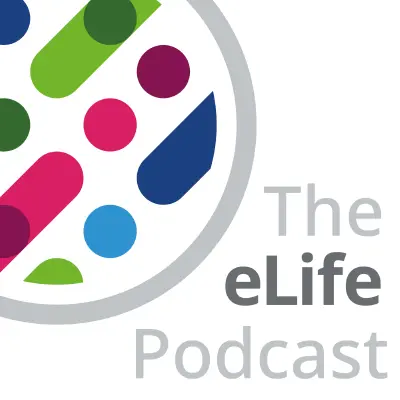
The eLife Podcast
98 episodes Last Updated: Jun 19, 25
The eLife Podcast, from eLife, the researcher-led, open access digital publication for outstanding research in life science and biomedicine.
Episodes
In the eLife podcast, a university compost heap has turned up Finland's first documented "giant virus". Also, why monkeys de-sand their supper, and how learning more languages actually makes brain tissue thinner. Then, the link between sugar and neonatal sepsis, and how a cancer controls its hydra host by bestowing it with extra tentacles... Get the references and the transcripts for this programme from the Naked Scientists website
What is the impact of an extra year at school on the brain? Also, how poison dart frogs come by their toxins, using movies to track the developing infant nervous system, the insect-spread bacterial plant parasite that is a mastermind of matchmaking, and a new cancer tool to link disease with the best drugs. Chris Smith takes a look at some of the most powerful papers out this month in eLife... Get the references and the transcripts for this programme from the Naked Scientists website
Feb 26, 2025
Hollywood helps brain scientists probe thoughts
This month, how films are helping neuroscientists link brain activity patterns to specific thought processes, a breakthrough in managing opiate overdose, a technique to study animal teamwork, extracting more information from brain scan data, and how childhood adversity blunts later fear responses... Get the references and the transcripts for this programme from the Naked Scientists website
Predicting how influenza viruses will evolve, how deserts decompose matter despite the dry, what worms are revealing about a gene linked to autism, and what makes mice fearful of cat smells. Dr Chris Smith talks to the authors of the latest leading research in eLife... Get the references and the transcripts for this programme from the Naked Scientists website
This month, signs that cancers communicate with the brain to alter mood, why antibodies are unreliable in research, evidence that social training can cut stress and boost brain volume, and agents derived from birth products that suppress inflammation and kill pain... Get the references and the transcripts for this programme from the Naked Scientists website
This month, Chris Smith hears how blood-thirsty bacteria sniff out wounds to trigger infections, how ants navigate at night, how male and female brains respond differently to starvation, and inflammation linked to premature labour... Get the references and the transcripts for this programme from the Naked Scientists website
This month, how human encroachment and conflict on nature drives emerging diseases, the role of "stigmergy" in guiding the nest-building feats of termites, a project to track infectious abortions in Africa, why people need to speak the same language around neurodiversity, and what fat flies are revealing about the way weight gain affects food-related recall... Get the references and the transcripts for this programme from the Naked Scientists website
Apr 19, 2024
Hibernation, Ketamine and Aphantasia
This month, how animals hibernate and evidence that muscle myosin makes its own heat in the cold, brain scans to reveal how ketamine relieves resistant depression, the way the brain changes when animals build a bond, the evolution of flu outbreaks, and how aphantasia affects autobiographical memory. Get the references and the transcripts for this programme from the Naked Scientists website
This month we hear what orangutans can tell us about the origins of human speech, we ask if science making life even harder for dyslexics, where do the scientists we train end up and do they stay in science, and new insights into the songs whales sing underwater... Get the references and the transcripts for this programme from the Naked Scientists website
In the eLife Podcast this month, signs that bees are oblivious to pesticides in nectar, sea anemone stinging strategies, a new means of cell-cell communication to share growth factors and other signals, how plants make a comeback when ice sheets retreat, and how the world's biggest bird uses wind and waves to good effect to minimise the costs of takeoff... Get the references and the transcripts for this programme from the Naked Scientists website